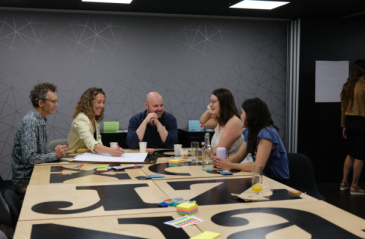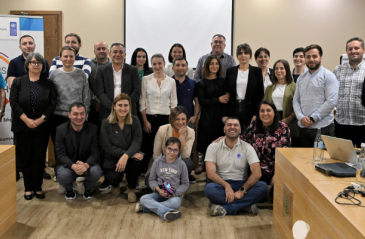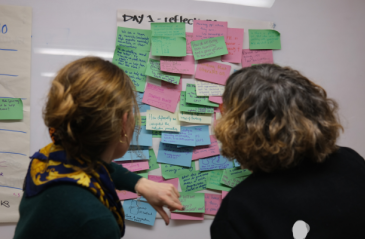
The power of storytelling in climate leadership

As @OECD's DAC Chair, @CharlottePetriG is on a mission to 'really make some big changes'
Share article@CharlottePetriG is helping co-ordinate and manage development finance for greater impact
Share articleFormer @SIDA chief @CharlottePetriG is aiming high with @OECD
Share articleWe put our vision for government into practice through learning partner projects that align with our values and help reimagine government so that it works for everyone.
Paris is home to the Champs-Élysées, the medieval lanes of the Marais, galleries and museums aplenty and, since September 2016, Charlotte Petri Gornitzka. The allure of taking over as chair of the OECD's Development Assistance Committee (DAC) was enough to persuade her to relocate from her native Stockholm and step down as director general of the Swedish International Development Agency (SIDA). It was a decision made easier by the sheer breadth of her new role, it transpires.
"The opportunity to work in the leading community for development and really think through how it can be an engine for contributing towards the delivery of the Sustainable Development Goals (SDGs) - it was too good to turn down," she explains. "The role is different to SIDA, where I was working for just the one government, whereas this is about working on behalf a large number of countries in a more indirect way. But it is already clear to me that, collectively, we have the strength to really make some big changes. Here, we really can - to quote the OECD's slogan - 'make better policies for better lives'."
DAC has long been a substantial feature of the development landscape. Created in 1961, it aims to coordinate and manage development finance for greater impact, and is a forum for many of the largest funders of development aid, with organisations such as the World Bank, the IMF and the UNDP participating as observers.
"DAC is one of the OECD's many committees, but it is very different from the others," explains Petri Gornitzka. "It is a powerful committee, which has been in place for over 50 years, so it is an institution set within the larger organisation. For me, it is moving towards not trying to be global in the sense of having a member in every country, but instead having a cross-border outreach. It has to keep evolving to stay relevant and, guided by the SDGs, these are not north-south but worldwide in scale."
Petri Gornitzka is well versed in global challenges. Her career has seen her move between a variety of positions, starting with a 10-year stint as a management consultant before switching sectors and taking up a role as head of marketing and communications for the Swedish Red Cross. Leadership roles for Save the Children in Sweden and Save the Children International then followed, before she took up her position at SIDA six years ago.
"I have a very mixed background," she concedes. "But from all of these different platforms, there has been a strong streak of change management - changing things from within, asking questions about how we can achieve our objectives and how we can become more relevant. Six years at SIDA felt about the right amount of time - both in terms of my energy and that of my colleagues around me - so it was good that this new role came along. Plus, it is good to move on from time to time."
Sweden, which is one of DAC's 30 member countries, is also one of the most generous providers of development assistance. Its programmes and projects stretch deep into many of the world's most poverty-stricken communities - something that has left Petri Gornitzka with a rich array of insights, which she can now deploy at DAC. Doing so and, at the same time, getting to understand the inner workings of the OECD and where to focus her attention are now among her top priorities.
"If DAC is not aligned with the overall OECD vision, then my role will just be a bridging role and we won't really accomplish as much as we can," she says. "So I am trying to find out where we fit in, not only within OECD but also within the global architecture that is focused on the SDG agenda. I want us to work very hard on the financing and resource mobilisation for development, as well as being more of a thought leader and helping open up new public-private partnerships - many of the things that I did at SIDA can be helpful here too.
“OECD has deep knowledge and expertise and, from where I sit, we don't use that enough. We talk about bringing the right finance portfolio to a country and raising domestic tax revenue - OECD is expert in that, and we should use it more as part of what we do as donors. Really, it is about combining the management of our internal organisation as well as maximising our impact on the frontline. This isn't easy, but I will be seeking to hold both sides together."
One thing that the development sector doesn't lack for is challenges. Fragile growth in developing countries, the ever-present risk of new pandemics, climate change, limited financial resources - the list goes on. World Bank president, Jim Yong Kim, recently highlighted growth, human capacity and resilience as his top three priorities and Petri Gornitzka doesn't disagree.
"Our interest in inclusive growth comes down to leaving no-one behind," she says. "Growth has taken some poor people into prosperity, and using this to help deliver on the SDG agenda is important. Development aid has also included human capacity building for a long time - sometimes successfully, sometimes less so. This can be costly and can involve reforms like building a completely new education system. Alternatively, it can be smaller-scale and very good value for money. Development aid is not necessarily always smart when it comes to small solutions - sometimes it takes just a few individuals investing in their own capacity to develop another country, so we need to unpack this a little bit."
She goes on to say that "resilience", which has become increasingly prevalent in recent years, needs to be more than "just a buzzword". Instead, it needs to symbolise humanitarian aid and development assistance coming together anew. "It should be seen as an entry point for getting all the actors in the sector to work together better and deliver as one," she explains. "Under my leadership, DAC will go back to the grand bargain that was made in Istanbul and work with others to see how we can really implement this agenda - longer-term funding and greater transparency from aid agencies in the way the funds are spent."
Although it is still early days, it is clear that Petri Gornitzka is already making her mark. She is keen to stress that her various experiences have afforded many lessons in how to achieve objectives - while admitting that there is always more to learn. "I am humble enough to say I haven't cracked how to achieve a positive impact, but I live in hope! Certainly, you should always be learning new tools and new approaches. But there are probably three aspects that are worth reiterating," she says.
"Firstly, finding the right language is important. The results language that the development community uses sometimes make things too complicated. At SIDA, I tried to introduce a simpler language where we focused on what it was we actually wanted to achieve, what happened and whether it was a success. It was about using language that was simple, because the answers are often so difficult. It is better to spend time on the really complicated stuff, rather than getting lost in internal corporate bureaucracy - where you can end up further away from reality.
"Secondly, in my world I have I heard the word ‘contribute' a number of times. Sweden is one of the largest donors but not the biggest, and so I sought to challenge my colleagues about whether it was acceptable for us to always 'contribute' but never 'lead'. If you contribute to something then you react to something initiated by others, and this is fine, but equally you should also seek to be in the driver's seat as well. I wanted us to have that capacity - which is expected of one of the world's biggest agencies - to really take a lead and have a view. We had to be able to take responsibility for our position. When we did this, we became more proactive and thought through our strategy with a different mindset, and I think this helped us become more solution-oriented.
"And thirdly, you have to have stretch targets. You should always aim high, because this forces you to explain your thinking. It might not be the right thinking, but you have to challenge yourself, talking to your colleagues and stakeholders, so you build quality around the vision. If you're not ambitious then you don't have to explain and then you're not maximising your potential."
There is no doubt that these three lessons will shape and influence Petri Gornitzka's thinking as she both settles in and gears up for her new life at the OECD. Another priority, however, is to improve her French. "I love living in Paris but my French is, shall we say, a work in progress - I need my own stretch targets here!"












